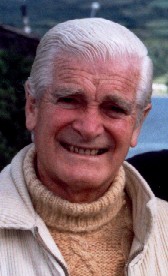It was a very simple occasion: the small and humble shared with Pope Francis the celebration of the canonization of the Universal Brother. Brother Charles died of an 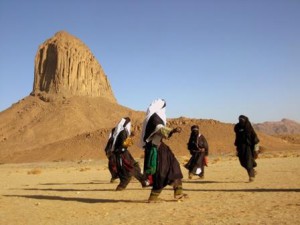 “overdose of humanity”. This, and no other, was the prevailing reason for proclaiming the holy man to be a saint, though he would never have imagined seeing his image in that “Bernini’s Glory” made with great love by the tuaregs on the great haima (carpet) which they erected near Tamanrasset, and composed of pieces of blue cloth and small rocks from the place: bits of the life of the men and women of this earth and pieces of the planet, the work of God; stones which are not hurled as weapons, but rather the heritage of a wonderful world that sustains and governs us, as Francis of Assisi used to say in his Canticle of Creation.
“overdose of humanity”. This, and no other, was the prevailing reason for proclaiming the holy man to be a saint, though he would never have imagined seeing his image in that “Bernini’s Glory” made with great love by the tuaregs on the great haima (carpet) which they erected near Tamanrasset, and composed of pieces of blue cloth and small rocks from the place: bits of the life of the men and women of this earth and pieces of the planet, the work of God; stones which are not hurled as weapons, but rather the heritage of a wonderful world that sustains and governs us, as Francis of Assisi used to say in his Canticle of Creation.
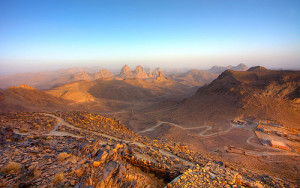 Pope Francis enjoyed speaking Arabic with his Argentinian accent. The strong wind swept away his pages, which flew through the dunes, but he continued speaking in Spanish, and everyone understood him, all those present, each with his own language and culture, his different skin colour and his heart open to the festivity and the sharing. Jesus, the Master, has given us a lesson in universal brotherhood, – a Master crazy
Pope Francis enjoyed speaking Arabic with his Argentinian accent. The strong wind swept away his pages, which flew through the dunes, but he continued speaking in Spanish, and everyone understood him, all those present, each with his own language and culture, his different skin colour and his heart open to the festivity and the sharing. Jesus, the Master, has given us a lesson in universal brotherhood, – a Master crazy 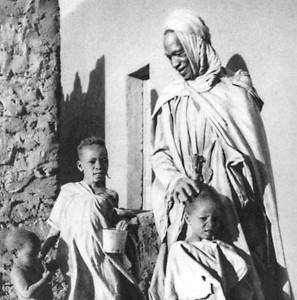 about his disciples and every human being; a free-spirited dreamer, who reiterates in every loving gesture his commitment to us. The Pope shared with us the bread of the very poorest, that which Jesus shared with his friends, – as he had done at the canonization of Archbishop Romero – , who always has been Saint Romero of America -, the one who only is accepted when he is poor and feels himself as one in need of the mercy of God and of his neighbour. It is that bread which brother Charles could not share in either great or small celebrations when he lived on the African stage, but he made it present with his life and his condition of being a neighbour and man of God, in the Nazareth of sharing with the people tea and dates, feeling himself in need of others, fragile and humble.
about his disciples and every human being; a free-spirited dreamer, who reiterates in every loving gesture his commitment to us. The Pope shared with us the bread of the very poorest, that which Jesus shared with his friends, – as he had done at the canonization of Archbishop Romero – , who always has been Saint Romero of America -, the one who only is accepted when he is poor and feels himself as one in need of the mercy of God and of his neighbour. It is that bread which brother Charles could not share in either great or small celebrations when he lived on the African stage, but he made it present with his life and his condition of being a neighbour and man of God, in the Nazareth of sharing with the people tea and dates, feeling himself in need of others, fragile and humble.
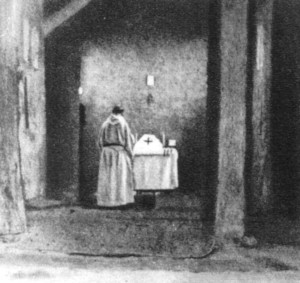 It was a great joy being with people from around the world, among the last come from everywhere. Believers and unbelievers, Christians and non-Christians who, above religious forms, seek peace, equality for all, and the common good. There was no showy decorations, no golden tunics nor cardinals, bishops or priests in flashy dress: no uniforms or weapons, even purely decorative ones. Jesus become human for us and made a friend of all by the will of the merciful Father and with sufficient capacity to hold in his heart all the poor of the world, all who flee war, all ill-treated by a system where the only god is economic gain, even at the expense of human lives; the permanently crucified Jesus of those who have nothing, risen in every man or woman who begins to be born.
It was a great joy being with people from around the world, among the last come from everywhere. Believers and unbelievers, Christians and non-Christians who, above religious forms, seek peace, equality for all, and the common good. There was no showy decorations, no golden tunics nor cardinals, bishops or priests in flashy dress: no uniforms or weapons, even purely decorative ones. Jesus become human for us and made a friend of all by the will of the merciful Father and with sufficient capacity to hold in his heart all the poor of the world, all who flee war, all ill-treated by a system where the only god is economic gain, even at the expense of human lives; the permanently crucified Jesus of those who have nothing, risen in every man or woman who begins to be born.
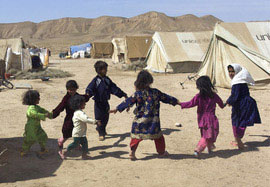 And there they were, perfectly following the ceremony without large offerings, without the hypocrisy of diplomatic protocol or hypocrisy often dressed up as religion. People, without the right to speak, to means of well-being, to schooling or university, to free health care and medication, to ways of living in dignity with a roof or house, to some food and land of their own. They were there in their thousands, without making noise or great speeches. They who had never heard speak of Brother Charles or of Jesus of Nazareth.
And there they were, perfectly following the ceremony without large offerings, without the hypocrisy of diplomatic protocol or hypocrisy often dressed up as religion. People, without the right to speak, to means of well-being, to schooling or university, to free health care and medication, to ways of living in dignity with a roof or house, to some food and land of their own. They were there in their thousands, without making noise or great speeches. They who had never heard speak of Brother Charles or of Jesus of Nazareth.
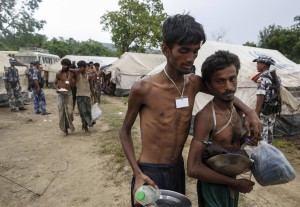 There was Shilma, a refugee of a rejected ethnic group in a country of Southeast Asia, Myanmar. A mother of six children, without her people, without resources. The face of millions of people trapped by the great differences which men have set up to distinguish some beings from others. Her husband, Modid, attends daily to search in the camp for sustenance for his family; he suffers from all the effects of malaria
There was Shilma, a refugee of a rejected ethnic group in a country of Southeast Asia, Myanmar. A mother of six children, without her people, without resources. The face of millions of people trapped by the great differences which men have set up to distinguish some beings from others. Her husband, Modid, attends daily to search in the camp for sustenance for his family; he suffers from all the effects of malaria
Golu, who is ten, collects rubbish in a part of India, and must support his family so they can eat once a day the rice that takes away the hunger, but fails to nourish as in Western countries or among the wealthy of his own country. Golu dreams of the day in which he will be able to study, and learn to live in the world with his full rights.
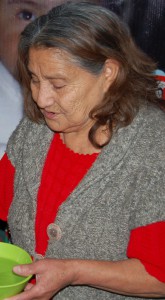 Margarita, from Mexico City, cares for her grandson who has been totally disabled for twenty-five years, fighting and working for her family; a woman of faith and convinced that prayer and trust in Jesus are her true strength. She prays to Our Lady of Guadalupe not only for her grandson, or her family or her neighbours; she prays for the poorest of the poor no matter what country they are from and where they are.
Margarita, from Mexico City, cares for her grandson who has been totally disabled for twenty-five years, fighting and working for her family; a woman of faith and convinced that prayer and trust in Jesus are her true strength. She prays to Our Lady of Guadalupe not only for her grandson, or her family or her neighbours; she prays for the poorest of the poor no matter what country they are from and where they are.
Aboubakar, a teenage from de Burkina Faso, small, malnourished, with HIV as the only legacy from his parents, smiling, impressed since he is not the only person in the world who has problems. His big eyes make me think of the eyes of the Creator.
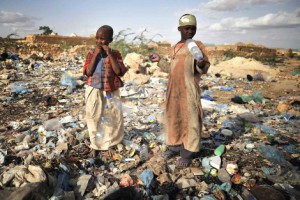 Hadmed, seventy years, has spent half a lifetime in Yarmuk refugee camp in Syria. The war remains his daily companion, like the unending mp3 music in the ears of any European or American youth. Hadmed continues thinking of peace, peace in simple things and between people, children of the same God, who is prayed to in mosques, in churches, in pagodas or in synagogues.
Hadmed, seventy years, has spent half a lifetime in Yarmuk refugee camp in Syria. The war remains his daily companion, like the unending mp3 music in the ears of any European or American youth. Hadmed continues thinking of peace, peace in simple things and between people, children of the same God, who is prayed to in mosques, in churches, in pagodas or in synagogues.
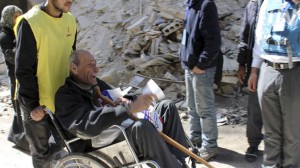 And Terry, who strolls each day along the esplanade beside the sea at Cairns, in the North of Australia, each day dragging his one leg. He lost the other one because of his bad blood-circulation. Alcohol runs through his veins together with bad memories of having lost everything: family, work, friends… Each night he receives the kindness of volunteers at a home for the extremely poor. Despite all, he continues laughing and speaks to everyone of his hopes and realities. He is a great conversationalist. I’d say that the only one who does not hear him is Warrior, his old and deaf dog. He says he has no religion, but who knows…
And Terry, who strolls each day along the esplanade beside the sea at Cairns, in the North of Australia, each day dragging his one leg. He lost the other one because of his bad blood-circulation. Alcohol runs through his veins together with bad memories of having lost everything: family, work, friends… Each night he receives the kindness of volunteers at a home for the extremely poor. Despite all, he continues laughing and speaks to everyone of his hopes and realities. He is a great conversationalist. I’d say that the only one who does not hear him is Warrior, his old and deaf dog. He says he has no religion, but who knows…
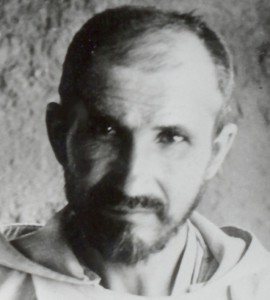 I met Raquel, a Spaniard, a regular on the poorly lit streets of Cartagena, where she works to continue consuming heroin and cocaine. Raquel is transsexual and never found her place in the family, or in society. She sells herself as a means of survival, but what really gives her life is the embrace of her companions, her support when she is well and when she wants disappear from this world. She wears a Rosary round her neck, as a necklace; she says that it brings her luck and protects her. She is ashamed to enter a church, because she is looked at askance and she draws a lot of attention, but she prays to God and to Our Lady when she passes through the door.
I met Raquel, a Spaniard, a regular on the poorly lit streets of Cartagena, where she works to continue consuming heroin and cocaine. Raquel is transsexual and never found her place in the family, or in society. She sells herself as a means of survival, but what really gives her life is the embrace of her companions, her support when she is well and when she wants disappear from this world. She wears a Rosary round her neck, as a necklace; she says that it brings her luck and protects her. She is ashamed to enter a church, because she is looked at askance and she draws a lot of attention, but she prays to God and to Our Lady when she passes through the door.
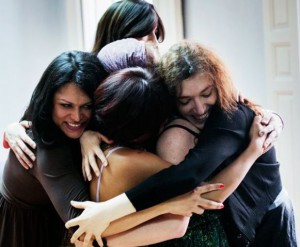 I could go on recounting the lives and the thousands of faces of Jesus in this canonization of Brother Charles, presided over by the Love of God and calls to consider any human being as a brother, as an equal. We all teach each other to be worthy of the same Father. Some recited the Prayer of Abandonment, others closed their eyes and dreamed of a better world. Some understood that fraternity is a way of
I could go on recounting the lives and the thousands of faces of Jesus in this canonization of Brother Charles, presided over by the Love of God and calls to consider any human being as a brother, as an equal. We all teach each other to be worthy of the same Father. Some recited the Prayer of Abandonment, others closed their eyes and dreamed of a better world. Some understood that fraternity is a way of 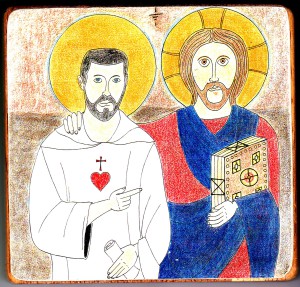 living and of growing in spirituality and in the commitment to give without expecting to receive in everyday tasks, others felt that they were not alone. We looked at each other and there was nothing strange between us, and we understood that the message of the life of this man, a man of God, transcends borders and religions, a life of faith and living without God. His message of universal brotherhood, his death and resurrection caused by “an overdose of humanity”.
living and of growing in spirituality and in the commitment to give without expecting to receive in everyday tasks, others felt that they were not alone. We looked at each other and there was nothing strange between us, and we understood that the message of the life of this man, a man of God, transcends borders and religions, a life of faith and living without God. His message of universal brotherhood, his death and resurrection caused by “an overdose of humanity”.
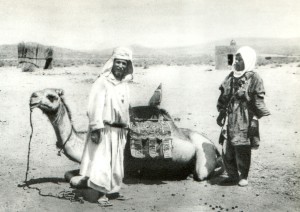 Saint Charles de Foucauld, pray for us.
Saint Charles de Foucauld, pray for us.
Santiago, Chile, June 2015



